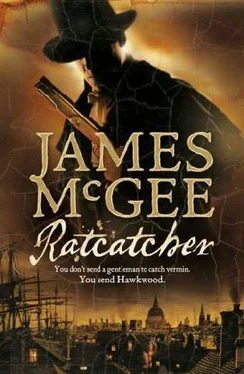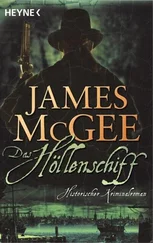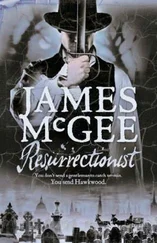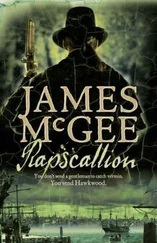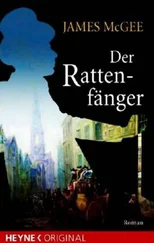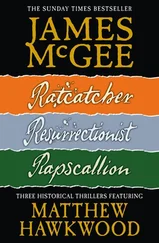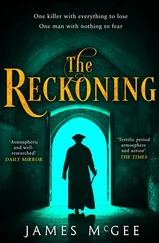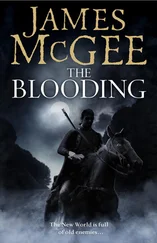James McGee - Ratcatcher
Здесь есть возможность читать онлайн «James McGee - Ratcatcher» — ознакомительный отрывок электронной книги совершенно бесплатно, а после прочтения отрывка купить полную версию. В некоторых случаях можно слушать аудио, скачать через торрент в формате fb2 и присутствует краткое содержание. Жанр: Исторический детектив, на английском языке. Описание произведения, (предисловие) а так же отзывы посетителей доступны на портале библиотеки ЛибКат.
- Название:Ratcatcher
- Автор:
- Жанр:
- Год:неизвестен
- ISBN:нет данных
- Рейтинг книги:4 / 5. Голосов: 1
-
Избранное:Добавить в избранное
- Отзывы:
-
Ваша оценка:
- 80
- 1
- 2
- 3
- 4
- 5
Ratcatcher: краткое содержание, описание и аннотация
Предлагаем к чтению аннотацию, описание, краткое содержание или предисловие (зависит от того, что написал сам автор книги «Ratcatcher»). Если вы не нашли необходимую информацию о книге — напишите в комментариях, мы постараемся отыскать её.
Ratcatcher — читать онлайн ознакомительный отрывок
Ниже представлен текст книги, разбитый по страницам. Система сохранения места последней прочитанной страницы, позволяет с удобством читать онлайн бесплатно книгу «Ratcatcher», без необходимости каждый раз заново искать на чём Вы остановились. Поставьте закладку, и сможете в любой момент перейти на страницу, на которой закончили чтение.
Интервал:
Закладка:
Emerging from the warehouse and into the main river, Hawkwood’s eyes had moved instinctively to the steps where he’d left Jago. The boat was still there. Jago wasn’t. Had the boat been absent, it might have suggested that Jago had done as he was told and was now en route to alert Chief Magistrate Read. The fact that the boat was still in place meant it was more than likely that Jago had disobeyed Hawkwood’s instructions. Knowing Jago, the sergeant, restless at Hawkwood’s failure to return, had probably gone looking for him. No surprise there, Hawkwood thought, feeling a sudden rush of affection for the big man. Jago riding to the rescue, again. Only this time he’d be too damned late.
“Master Woodburn told me the vessel suffered damage,” Hawkwood said. He had the strong urge to keep Lee talking. As a means of delaying the inevitable, he didn’t think it would be that effective, but at this juncture, he was prepared to try anything.
Lee took a leisurely draw on his cheroot and flicked ash over the gunwale. “Nothing that couldn’t be fixed.” He looked at Hawkwood with amusement. “Storm in the Channel it was. Lost a man, too. Which is how I ended up with Sparrow there. Scully brought him in.” Lee took the cheroot out of his mouth and jabbed the stub towards Hawkwood’s face. “Now I’ve lost Scully, too. You, sir, have a great deal to answer for.”
“So, why here?” Hawkwood voiced the question that had been gnawing at him since he and Jago had left James Read’s office. “It’s bloody madness. You could have waited until the ship was in the estuary, given yourself room to manoeuvre, given yourself an escape route. Christ, man, this is a bloody death trap!”
Lee drew on his cheroot and spread an arm. “You know why they built the yards here, Officer Hawkwood? It’s so they’d be close to London and protected from foreign invasion. Deptford ain’t the largest, it ain’t the most strategic, and it ain’t Chatham or Portsmouth, but by Christ it’s the one that’s going to make ’em sit up and take notice! Can you imagine the effect when I sink your newest goddamned ship in the middle of your goddamned capital city, and with the Prince of Wales on board? Your Admiralty boys’ll be soiling their breeches for a month! It’ll set back your war effort so far, you might as well go ahead and scuttle your whole damned navy! That’s why we’re here, Officer Hawkwood.”
The door to the cell stood ajar. Jago used the cudgel to push the door open and the smell of death hit him. The body lay across the bed, face up. The artery in the neck had been punctured and there was a great deal of blood. The room stank of it.
Jago was not, by nature, a religious man, but he crossed himself nonetheless, and as he stared down at the corpse he felt himself torn by twin emotions: intense rage at the manner of death, and the absolute gut-wrenching certainty that he was unlikely to see Hawkwood alive again.
Lee stared out over the bow. They had been making good headway. To port lay the Isle of Dogs, a low-lying stretch of sparsely inhabited meadow and marshland. Only two roads served the Isle. The Deptford and Greenwich Road followed the shore, granting land access to the few isolated wharves and industries that occupied the east bank. The Chapel House Road bisected the Isle, connecting the Ferry House, on the southern bend of the river, with the Blackwall entrance to the West India Docks. Lee turned his eyes to the opposite bank, which was far more congested. Thickets of tall mastheads had begun to clutter the skyline as the heavily laden merchantmen awaited their turn for admission into the big dockyards. The entrance to the No. 1 Commercial Dock was visible over the starboard beam. Next to it, the smaller East Country Dock marked the Surrey-Kent border. Immediately south of the border was Dudman’s Yard, with its mooring docks catering for the transports carrying convicts to the other side of the world. Beyond that, less than a mile distant, lay the Royal Dockyard, and his prey.
At a nod from the American, Sparrow, with quiet assurance, eased back on the tiller, taking them off the wind. The bow dipped. Without the advantage of the breeze, the sail began to flap listlessly.
Lee narrowed his eyes, and flicked the remnant of his cheroot over the side. “I’d say it’s time, Mr Sparrow.”
Sparrow lashed the tiller and moved to the mast. It took only seconds to lower the sail, lift the mast out of its socket and secure it to the deck.
The American touched his temple in salute and indicated the open hatch. “This way, Captain Hawkwood, if you please.”
Hawkwood hesitated. He was conscious that behind him Sparrow’s pistol was now drawn and cocked, and pointed at the back of his skull. Hawkwood rose to his feet and watched as the American backed down the hatchway. Lee had been right. The hatch was very small. It looked like a tight fit. Hawkwood stepped across the deck. He knew he had no choice. He couldn’t take on two armed men. The sensible thing, therefore, was to follow orders in the hope that an opportunity for retaliation would present itself in the not too distant future. Heart thumping, he followed Lee down the ladder and into the boat.
At the bottom of the ladder, Lee stepped aside. “Officer Hawkwood, welcome to the Narwhale.”
Emerging from the warehouse, Jago hawked and spat on to the cobbles. So much for that idea. He had searched the building from top to bottom. No Hawkwood, and no mysterious undersea boat either. But there had been a dead body, and given what he had been told by Hawkwood, it hadn’t been difficult to guess the identity of the corpse. It had to be the clockmaker. Which meant it was likely the conspirators had been using the warehouse as a rendezvous. And the old man’s death could only mean one thing: he had outlived his usefulness. The American, William Lee, was covering his tracks. Which meant Jago had to get word to James Read, and fast.
But where the hell was Hawkwood?
Back at the jetty, Jago stared down at the river. At least the bloody dinghy was still there. He knew he was missing something, but what? Then it hit him. When he’d searched the warehouse, the doors to the underground loading dock had been open. When he had arrived at the jetty with Hawkwood the doors had been closed. The thought occurred to Jago that instead of watching the warehouse and the comings and goings on the wharf, he should have been paying more attention to the bloody water. And there was something else.
The old man’s blood was still wet.
Jago looked around quickly, his eyes lifting. Then he was running.
They were known as widow walks: balconies that ran around the top floors of the warehouses and riverside storage buildings. It was here that sailors’ wives kept watch for the ships carrying their menfolk home. Years ago, from the highest platform on a fine day, an observer with a keen eye and a good spyglass could see clear across the flat expanse of the Isle of Dogs to the East India Docks, Bugsbys Marsh and the stretch of river beyond. On some of the older buildings a spyglass was a permanent fixture, enabling merchants and ship owners first sight of returning vessels. In nature the early bird catches the worm. And so it was in commerce. News that a ship had been sighted would radiate through the city like ripples in a pond. Tea, tobacco, spices and silks; the earliest arrivals always commanded the best prices. For want of a spyglass a healthy profit could be won or lost.
From the high balcony of Maggot amp; Sons, Wool Merchants, Jago, with a borrowed telescope jammed against his right eye, quartered the river. Part of his brain told him that looking on top of the water for a vessel that could travel beneath the surface was an exercise in futility, but he didn’t know what else to do and he had to do something.
Читать дальшеИнтервал:
Закладка:
Похожие книги на «Ratcatcher»
Представляем Вашему вниманию похожие книги на «Ratcatcher» списком для выбора. Мы отобрали схожую по названию и смыслу литературу в надежде предоставить читателям больше вариантов отыскать новые, интересные, ещё непрочитанные произведения.
Обсуждение, отзывы о книге «Ratcatcher» и просто собственные мнения читателей. Оставьте ваши комментарии, напишите, что Вы думаете о произведении, его смысле или главных героях. Укажите что конкретно понравилось, а что нет, и почему Вы так считаете.
